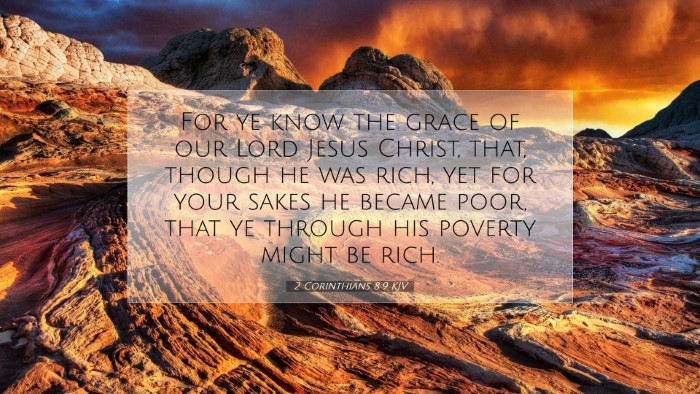Commentary on 2 Corinthians 8:9
Verse Reference: 2 Corinthians 8:9 - "For you know the grace of our Lord Jesus Christ, that though he was rich, yet for your sakes he became poor, that ye through his poverty might be rich."
Introduction
This verse stands at the heart of Paul's appeal to the Corinthians regarding generosity and sacrificial giving. It encapsulates the essence of Christ's humility and the profound implications of His condescension for believers. In drawing upon the rich theological insights from public domain commentaries, we explore the depth of this scripture.
Theological Significance
The phrase "the grace of our Lord Jesus Christ" is foundational in understanding the incarnational nature of Christ's mission. Matthew Henry notes that grace is not just unmerited favor but embodies the entire essence of Christ's work on behalf of humanity. This grace is exemplified in Christ's intentional transition from divine wealth to human poverty.
Albert Barnes emphasizes that Christ's richness is both material and spiritual. In heaven, He possesses all authority and glory, contrasting sharply with His earthly existence where He embraced poverty. In becoming poor, He identified with human suffering and need, demonstrating His profound love and commitment to humanity's redemption.
Exegesis of Key Phrases
- "Though he was rich": This phrase encapsulates the divine nature of Christ, reflecting His pre-existence and sovereign authority (John 1:1). Adam Clarke elaborates on the richness of Christ, not only as the eternal Son of God but also as the One who possessed all blessings and privileges in the heavenly realms.
- "Yet for your sakes": The motivation behind Christ's incarnation and subsequent sacrifice is profoundly altruistic. Henry suggests that this selfless act was for the benefit of sinners, highlighting that Christ’s love was manifest in His willingness to assume our state of poverty—both spiritually and materially.
- "He became poor": This poverty speaks to both His humble birth in a manger and His life of simplicity (Luke 2:7). Clarke asserts that Christ’s life on earth was devoid of luxuries, exemplifying a life committed to serving rather than being served.
- "That ye through his poverty might be rich": As a result of Christ's impoverishment, believers gain access to spiritual riches. Barnes points out that this richness encompasses grace, spiritual blessings, and eternal life—a true wealth that transcends material possessions.
Implications for Believers
The call to recognize Christ's grace has profound implications for the Christian life. As Paul appeals to the Corinthians for their generosity, he draws upon the model of Christ's sacrificial giving. This example encourages believers to engage in acts of compassion and charity towards others.
1. Modeling Generosity: Just as Christ gave of Himself, so too are believers called to give. Henry notes that generosity is not merely a financial transaction but an expression of love. The poor widow's offering (Mark 12:41-44) exemplifies sacrificial giving aligned with the spirit of 2 Corinthians 8:9.
2. Embracing Humility: Jesus' humility is a model for believers, challenging any desire for pride or self-dependence. Clarke encourages readers to reflect on their own attitudes toward wealth and stewardship. In embracing humility, believers can more fully appreciate their dependence on God's grace.
3. Spiritual Awakening: Understanding Christ’s sacrifice awakens a consciousness toward the needs around us. Barnes emphasizes that acknowledging one's own spiritual poverty can lead to a desire to share the riches of grace with others, inspiring actions that contribute to the welfare of the community.
Conclusion
2 Corinthians 8:9 presents a transformative perspective on wealth, poverty, and grace. In deeply understanding the condescension of Christ, believers are compelled to respond with lives characterized by generosity, humility, and love. As we reflect on this verse, let us strive to embody the grace demonstrated through Christ, realizing that in our acts of giving, we reflect the very heart of our Savior. May this understanding lead us to greater acts of charity and a deeper appreciation of the spiritual riches we possess through Jesus Christ.


